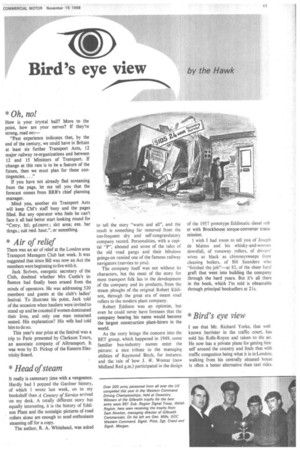Bird's eye view
Page 45

If you've noticed an error in this article please click here to report it so we can fix it.
* Oh no!
How is your crystal ball? More to the point, how are your nerves? If they're strong, read on:—
"Past experience indicates that, by the end of the century, we could have in Britain at least six further Transport Acts, 12 major railway re-organizations and between 12 and 15 Ministers of Transport. If change at this rate is to be a feature of the future, then we must plan for these contingencies..
If you have not already fled screaming from the page, let me tell you that the forecast comes from BRB's chief planning manager.
Mind you, another six Transport Acts will keep CM's staff busy and the pages filled. But any operator who feels he can't face it all had better start looking round for "Cntry. htl; gd.tnovr.; slct area; exe. bar tkngs.; suit retd. haur.", or something.
* Air of relief
There was an air of relief at the London area Transport Managers Club last week. It was suggested that since Bill was now an Act the members were beginning to live with it.
Jack Seriven, energetic secretary of the Club, doubted whether Mrs Castle's influence had finally been erased from the minds of operators. He was addressing 520 members and guests at the club's ladies' festival. To illustrate his point, Jack told of the occasion when hauliers were invited to stand up and be counted if women dominated their lives, and only one man remained seated. His explanation? His wife had told him to do so.
This year's star prize at the festival was a trip to Paris presented by Clarkson Tours, an associate company of Alltransport. It was won by D. Pickup of the Eastern Electricity Board.
* Head of steam
It really is centenary time with a vengeance. Hardly had I popped the Gardner history, of which I wrote last week, on to my bookshelf than A Century of Service arrived on my desk. A totally different story but equally interesting, it is the history of Eddison Plant and the nostalgic pictures of road rollers alone are enough to send enthusiasts steaming off for a copy.
The author, R. A. Whitehead, was asked to tell the story "warts and all", and the result is something far removed from the too-frequent dry and self-congratulatory company record. Personalities, with a capital "P", abound and 'some of the tales of the old road gangs and their bibulous goings-on remind one of the famous railway navigators (navvies to you).
The company itself was not without its characters, but the meat of the story for most transport folk lies in the development of the company and its products, from the steam ploughs of the original Robert Eddison, through the great era of steam road rollers to the modern plant company.
Robert Eddison was an optimist, but even he could never have foreseen that the company bearing his name would become the largest construction plant-hirers in the world.
As the story brings the concern into the BET group, which happened in 1949, some familiar bus-industry names enter the picture: a nice tribute to the managing abilities of Raymond Birch, for instance, and the tale of how J. W. Womar (now Midland Red g.m.) participated in the design of the 1957 prototype Eddimatic diesel roller with Brockhouse torque-converter transmission.
I wish I had room to tell you of Joseph de Mattos and his whisky-and-women downfall, of runaway rollers, of drivers' wives as black as chimneysweeps from cleaning boilers, of Bill Saunders who "finished the job"—at 82, of the sheer hard graft that went into building the company through the hard years. But it's all there in the book, which I'm told is obtainable through principal booksellers at 21s.
* Bird's eye view
I see that Mr. Richard Yorke, that wellknown ,barrister in the traffic court, has sold his Rolls-Royce and taken to the air. He now has a private plane for getting himself around the country and finds that with traffic congestion being what it is in London, walking from his centrally situated house is often a better alternative than taxi rides.




















































































































